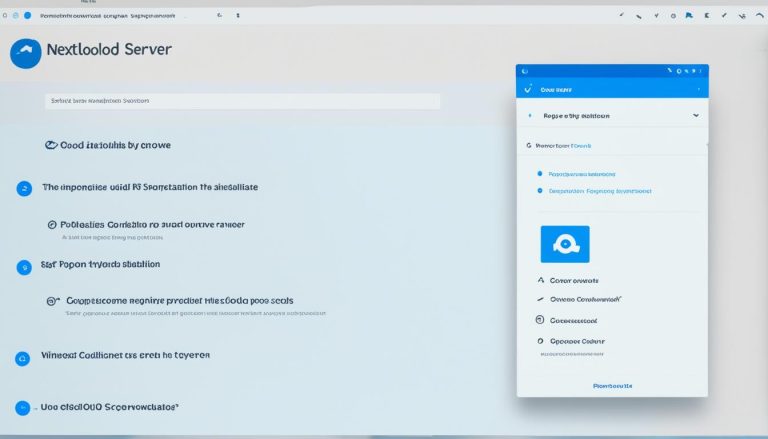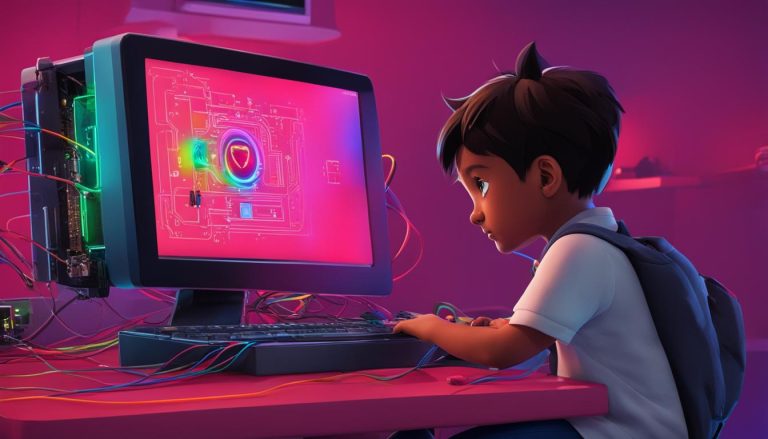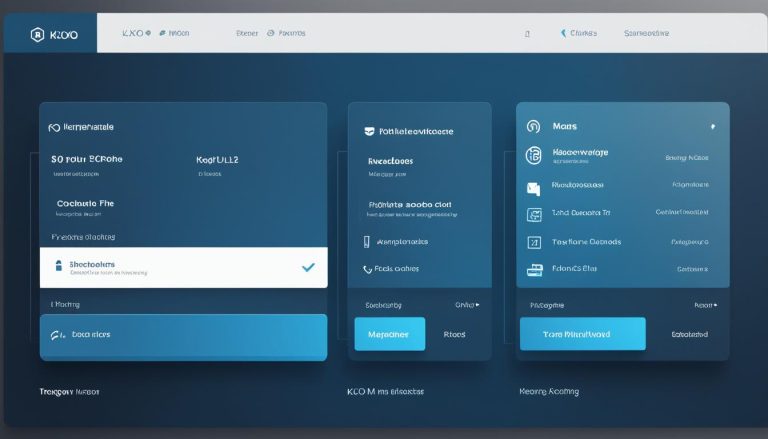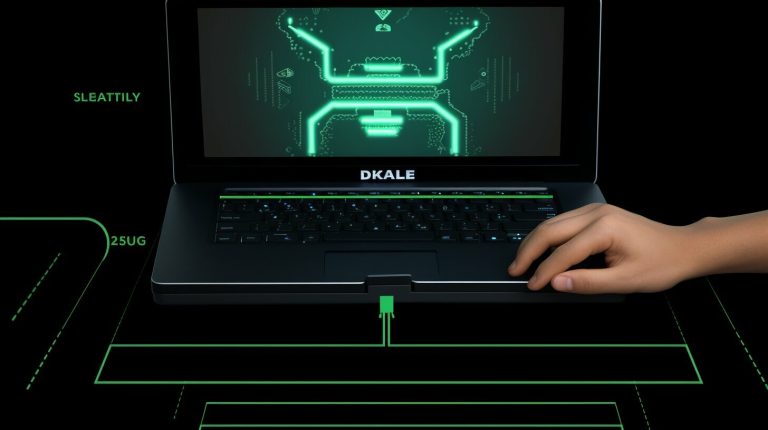Understanding Debian: What is Debian and Why It Matters
Debian is an operating system that has been around since 1993. It is known for its stability, dependability, and long release cycles. Debian is more than just an operating system; it is a GNU/Linux distribution and a Unix-like operating system. With a strong community of volunteers contributing to its development, Debian offers a wide range of software support and is compatible with multiple PC architectures.
Debian is a popular choice for both desktop and server environments. It is known for its integration, usability, and extensive documentation. The Debian distribution is versatile and offers a rolling release option, allowing users to enjoy the latest features and updates. Whether you are a beginner or an experienced user, Debian provides a user-friendly experience and customizable options.
Key Takeaways:
- Debian is a GNU/Linux distribution and Unix-like operating system.
- It is known for its stability, dependability, and long release cycles.
- Debian has a strong community of volunteers contributing to its development.
- It offers a wide range of software support and compatibility with multiple PC architectures.
- Debian provides a user-friendly experience and customizable options for both desktop and server environments.
Why Choose Debian: The Benefits of Using Debian
When it comes to choosing an operating system, Debian offers a multitude of benefits that make it a top choice for users. One of the key advantages of Debian is its stability. With long release cycles and a rigorous testing process, Debian ensures that the software is reliable and performs well, minimizing crashes and system errors. This stability is especially crucial for businesses and organizations that require a dependable operating system to run their critical applications.
Another significant benefit of using Debian is its extensive software support. Debian has a vast software repository, offering over 51,000 packages that cover a wide range of applications and utilities. Whether you need office productivity tools, media players, or development environments, Debian’s software repository has you covered. The distribution also supports the DEB package format, making it effortless to find and install software on your Debian system.
Furthermore, the community-driven nature of Debian ensures excellent software support and frequent updates. The Debian community is composed of passionate volunteers who actively contribute to the development and maintenance of the distribution. This active involvement results in a robust support network and consistent updates to address any software issues or security vulnerabilities that may arise. With Debian, you can expect prompt and reliable software support from a dedicated community of users and developers.
Debian Benefits
Debian stability and software support are two key benefits that users can enjoy. The stability of Debian ensures a reliable and crash-free experience, while the extensive software repository offers a wide range of applications to meet diverse needs. Additionally, the community-driven nature of Debian guarantees excellent software support and frequent updates, ensuring that users can rely on a responsive and robust operating system.
The Philosophy and Community of Debian
Debian’s philosophy is deeply rooted in the values of free software and the belief that software should be developed, shared, and maintained without a profit motive. The Debian community, consisting of passionate volunteers, plays a crucial role in maintaining and improving the distribution. This community-driven approach fosters collaboration and encourages contributions from individuals with diverse backgrounds and expertise. The Debian project is a shining example of the power of open-source collaboration and the dedication of its community members.
The Debian community is committed to upholding the principles of openness, transparency, and inclusivity. The project’s decision-making processes are democratically structured, with discussions and voting taking place within the community to shape the direction of Debian’s development. This ensures that decisions are made collectively and reflect the diverse perspectives and needs of the user base.
One of the remarkable aspects of the Debian community is its inclusiveness. Volunteers from around the world, irrespective of their geographical location, are welcome to contribute to the project. Debian provides ample resources and documentation to help newcomers get started, making it easy for anyone passionate about free software to join and make a difference. The welcoming and supportive nature of the Debian community allows individuals to grow and learn within the project, fostering a sense of belonging and camaraderie.

The dedication of the Debian community is evident in the continuous development and improvement of the distribution. Through collaborative effort, Debian has become a robust and reliable operating system that serves the needs of a diverse range of users. The philosophy and community behind Debian not only contribute to the technical excellence of the distribution but also embody the spirit of free software and the power of community-driven development.
The Features and Selection of Software in Debian
Debian offers a wide range of features and software selection, making it a versatile and customizable operating system. Its extensive software repository provides access to over 51,000 software packages, ensuring that users have a wide variety of options to choose from. Whether you’re looking for productivity tools, development software, or multimedia applications, Debian has you covered.
Table:
| Category | Number of Packages |
|---|---|
| Productivity | 8,500 |
| Development | 12,000 |
| Multimedia | 6,700 |
| Graphics | 3,200 |
| Utilities | 9,800 |
In addition to the vast selection of software, Debian packages are well-integrated and categorized based on priority and function. This ensures that the packages work seamlessly with each other, enhancing the overall user experience. Whether you’re a beginner or an advanced user, Debian’s user-friendly package management system makes it easy to find, install, and update software.
Debian also supports multiple desktop environments, including GNOME, KDE, Xfce, and LXQt, allowing users to personalize their graphical interface to their preferred look and feel. This flexibility, combined with the extensive software selection, makes Debian a highly customizable operating system that can cater to the unique needs of various users.
The Installation and Maintenance of Debian
Installing Debian is a straightforward process that can be done with ease. To get started, you need to download the appropriate installer image for your system architecture. Debian provides installer images for various PC architectures, including 32-bit and 64-bit Intel, PowerPC, ARM, and MIPS. This wide range of support makes Debian a flexible choice for users with different hardware configurations.
Once you have the installer image, you can create a bootable USB or DVD to begin the installation process. The Debian installer will guide you through each step, allowing you to customize the installation according to your preferences. It also provides options for disk partitioning, software selection, and user account setup.
Once Debian is installed, you can easily maintain it through regular updates and security patches. Debian has a dedicated security team that actively monitors and addresses any security vulnerabilities that may arise. This ensures that your system remains secure and up to date. Additionally, the Debian community is actively involved in maintaining and improving the distribution, providing ongoing support and updates for users.
With its straightforward installation process and active maintenance, Debian offers a reliable and secure operating system that can be easily managed by users of all levels of experience.

Table: Comparison of Debian Installation Options
| Installation Options | Pros | Cons |
|---|---|---|
| Graphical Installer | – Easy to use for beginners – Provides a visual interface – Step-by-step guidance |
– Requires more system resources – Slower installation process compared to the text-based installer |
| Text-based Installer | – Lightweight and efficient – Faster installation process – Suitable for low-end systems |
– May be less intuitive for users unfamiliar with command-line interfaces |
| Netboot Installer | – Minimal installation image – Allows customization and network-based installation |
– Requires network connectivity during installation – Advanced knowledge may be required |
| Unattended Installer | – Automated installation process – Suitable for deploying multiple systems |
– Requires initial configuration |
The table above provides a comparison of different installation options available in Debian. Each option has its own advantages and considerations, allowing users to choose the one that best suits their needs and preferences.
Portability and Hardware Support in Debian
Debian is renowned for its exceptional portability and extensive hardware support. Whether you’re running it on a 32-bit or 64-bit Intel system, PowerPC, ARM, or MIPS architecture, Debian offers a versatile solution to suit your hardware requirements. With its broad range of supported PC architectures, Debian ensures that users with various hardware configurations can enjoy a seamless experience.
Debian’s commitment to hardware support goes beyond compatibility. It ensures that all devices function smoothly with the operating system. From graphics cards to network adapters, Debian’s comprehensive support means you can trust that your hardware will be recognized and utilized effectively. This level of compatibility and reliability is crucial for users who rely on specific hardware components for their work or personal projects.
Hardware Support Matrix
To provide a comprehensive overview of Debian’s hardware support, here is a detailed matrix showcasing the supported PC architectures:
| Architecture | Description |
|---|---|
| 32-bit Intel (i386) | Support for older 32-bit Intel-based systems. |
| 64-bit Intel (amd64) | Support for modern 64-bit Intel-based systems. |
| PowerPC | Support for PowerPC-based systems. |
| ARM | Support for ARM-based systems, such as embedded devices and single-board computers. |
| MIPS | Support for MIPS-based systems, including routers and embedded devices. |
Note: Debian’s hardware support is not limited to these architectures. The distribution also offers support for other less common architectures, ensuring compatibility with a wide range of devices.
Whether you’re a desktop user, a server administrator, or a developer working with specialized hardware, Debian’s extensive hardware support ensures that you can rely on the operating system to run smoothly on your chosen platform.
Security and Reliability in Debian
When it comes to security and reliability, Debian is a trusted choice for users who prioritize the protection of their systems and data. Debian is well-known for its strong commitment to security, providing regular updates and patches to address any vulnerabilities that may arise. The dedicated security team actively monitors the distribution to ensure a secure environment for users.
In addition to its robust security measures, Debian is highly regarded for its reliability. The thorough testing process and long release cycles contribute to the stability and dependability of the operating system. Users can rest assured that Debian will perform consistently and efficiently, even under demanding circumstances.
Debian’s reliability extends beyond its core functionalities. The extensive software repository and strong community support mean that users have access to a wide range of well-vetted applications. This ensures that the software running on Debian is compatible, well-maintained, and reliable.
| Key Features | Benefits |
|---|---|
| Regular updates and security patches | Ensures system security and protects against vulnerabilities |
| Thorough testing process | Enhances reliability and stability of the operating system |
| Wide range of well-vetted applications | Increased compatibility and reliability of software |
“Debian’s strong focus on security and reliability sets it apart from other operating systems. The regular updates and patches provide peace of mind, while the thorough testing process ensures a stable and dependable system. The extensive software selection, backed by a vibrant community, further enhances the reliability of Debian.”
Conclusion:
For users seeking a secure and reliable operating system, Debian is a top choice. Its commitment to security, thorough testing process, and extensive software support make it a reliable platform for both personal and professional use. With Debian, users can trust that their systems are protected and their software will perform consistently.
Performance and Scalability in Debian
When it comes to performance and scalability, Debian excels in providing a powerful and efficient operating system for both desktop and server environments. The stability and well-integrated nature of Debian contribute to its exceptional performance, allowing users to run their applications smoothly while utilizing minimal system resources. Whether you are a casual user or a business owner running multiple servers, Debian offers a reliable and high-performing platform to meet your needs.
One of the reasons behind Debian’s impressive performance is its focus on optimization and code efficiency. The dedicated community of developers and volunteers continuously work towards improving the performance of the distribution, ensuring that users get the most out of their hardware. Debian’s extensive software repository includes optimized packages that are specifically tailored for different architectures, resulting in enhanced performance and responsiveness.
Debian’s scalability is another noteworthy aspect, making it suitable for various workloads and adaptable to changing demands. With its support for a wide range of PC architectures, including Intel, PowerPC, ARM, and MIPS, Debian can be easily installed on different hardware configurations. This flexibility allows users to scale their systems effortlessly and accommodate the evolving needs of their projects or businesses.
In a server environment, Debian’s scalability shines through, enabling smooth operation of web servers, database servers, and other mission-critical services. The combination of Debian’s stability and scalability makes it an ideal choice for businesses that require reliable and high-performing servers to handle heavy workloads and fluctuations in traffic volume.
In summary, Debian’s performance and scalability make it an exceptional choice for users who prioritize efficiency, reliability, and adaptability. With its optimized code, extensive software repository, and support for multiple architectures, Debian provides a robust foundation for both personal and professional computing needs.
Conclusion
After exploring the various aspects of Debian, it is clear that this operating system offers numerous benefits and advantages. Its stability, dependability, and long release cycles make it a reliable choice for both desktop and server environments.
Debian’s extensive software support and large software repository make it easy to find and install applications, while its community-driven development ensures excellent software support and frequent updates.
With its commitment to free software and strong community, Debian continues to thrive and remain a leading force in the Linux ecosystem. Whether you are a beginner or an experienced user, Debian offers a user-friendly experience and plenty of customization options to suit your needs.
In conclusion, Debian is a powerful and versatile operating system that deserves its reputation. Its reliability, performance, and community support make it an excellent choice for individuals and organizations alike.
FAQ
What is Debian?
Debian is a GNU/Linux distribution and Unix-like operating system that has been around since 1993.
Why should I choose Debian?
Debian offers stability, dependability, and extensive software support, making it a popular choice among users who prioritize reliability.
What is the philosophy behind Debian?
Debian is rooted in the principles of free software and the belief that software should be developed, shared, and maintained without a profit motive.
What features and software selection does Debian offer?
Debian offers a wide range of features and software selection, allowing users to customize their operating system to meet their specific needs.
How do I install and maintain Debian?
Installing Debian is straightforward and well-documented. Once installed, Debian can be easily maintained through regular updates and security patches.
Does Debian support different hardware configurations?
Yes, Debian supports a wide range of PC architectures, making it a versatile choice for users with different hardware configurations.
Is Debian secure and reliable?
Yes, Debian takes security and reliability seriously, with regular updates, security patches, and a dedicated security team.
How does Debian perform in terms of efficiency and scalability?
Debian is known for its performance and scalability, making it suitable for both desktop and server environments.
Is Debian a popular choice among users?
Yes, Debian’s stability, extensive software support, and community-driven development make it a popular choice among users.
Source Links
- About the Author
- Latest Posts
Mark is a senior content editor at Text-Center.com and has more than 20 years of experience with linux and windows operating systems. He also writes for Biteno.com





